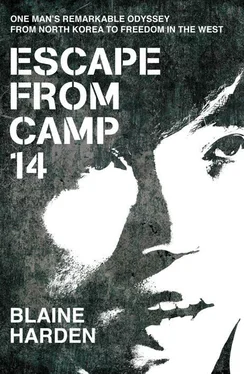She never talked to him about her past, her family, or why she was in the camp, and he never asked. His existence as her son had been arranged by the guards. They chose her and the man who became Shin’s father as prizes for each other in a ‘reward’ marriage.
Single men and women slept in dormitories segregated by sex. The eighth rule of Camp 14, as Shin was required to memorize it, said, ‘Should sexual physical contact occur without prior approval, the perpetrators will be shot immediately.’
Rules were the same in other North Korean labour camps. If unauthorized sex resulted in a pregnancy or a birth, the woman and her baby were usually killed, according to my interviews with a former camp guard and several former prisoners. They said that women who had sex with guards in an attempt to get more food or easier work knew that the risks were high. If they became pregnant, they disappeared.
A reward marriage was the only safe way around the no-sex rule. Marriage was dangled in front of prisoners as the ultimate bonus for hard work and reliable snitching. Men became eligible at twenty-five, women at twenty-three. Guards announced marriages three or four times a year, usually on propitious dates, such as New Year’s Day or Kim Jong Il’s birthday. Neither bride nor groom had much say in deciding whom they would marry. If one partner found his or her chosen mate to be unacceptably old, cruel, or ugly, guards would sometimes cancel a marriage. If they did, neither the man nor the woman would be allowed to marry again.
Shin’s father, Shin Gyung Sub, told Shin that the guards gave him Jang as payment for his skill in operating a metal lathe in the camp’s machine shop. Shin’s mother never told Shin why she had been given the honour of marriage.
But for her, as for many brides in the camp, marriage was a kind of promotion. It came with a slightly better job and better housing — in the model village, where there was a school and health clinic. Shortly after her marriage, she was transferred there from a crowded dormitory for women in the camp’s garment factory. Jang was also given a coveted job on a nearby farm, where there were opportunities to steal corn, rice and green vegetables.
After their marriage, the couple was allowed to sleep together for five consecutive nights. From then on, Shin’s father, who continued to live in a dormitory at his work site, was permitted to visit Jang a few times a year. Their liaison produced two sons. The eldest, Shin He Geun, was born in 1974. Shin was born eight years later.
The brothers barely knew each other. When Shin was born, his older brother was away in primary school for ten hours a day. By the time Shin was four, his brother had moved out of the house (at the mandatory age of twelve) and into a dormitory.
As for his father, Shin remembers that he sometimes showed up at night and left early in the morning. He paid little attention to the boy, and Shin grew up indifferent to his presence.
In the years after he escaped the camp, Shin learned that many people associate warmth, security and affection with the words ‘mother’, ‘father’ and ‘brother’. That was not his experience. The guards taught him and the other children in the camp that they were prisoners because of the ‘sins’ of their parents. The children were told that while they should always be ashamed of their traitorous blood, they could go a long way towards ‘washing away’ their inherent sinfulness by working hard, obeying the guards and informing on their parents. The tenth rule of Camp 14 said that a prisoner ‘must truly’ consider each guard as his teacher. That made sense to Shin. As a child and teenager, his parents were exhausted, distant and uncommunicative.
Shin was a scrawny, incurious and for the most part friendless child whose one source of certainty was the guards’ lectures about redemption through snitching. His understanding of right and wrong, though, was often muddied by encounters he witnessed between his mother and the camp guards.
When he was ten, Shin left his house one evening and went looking for his mother. He was hungry and it was time for her to prepare dinner. He walked to a nearby rice field where his mother worked and asked a woman if she had seen her.
‘She’s cleaning the bowijidowon ’s room,’ the woman told him, referring to the office of the guard in charge of the rice farm.
Shin walked to the guard’s office and found the front door locked. He peeked through a window on the side of the building. His mother was on her knees cleaning the floor. As Shin watched, the bowijidowon came into view. He approached Shin’s mother from behind and began to grope her. She offered no resistance. Both of them removed their clothes. Shin watched them have sex.
He never asked his mother about what he saw, and he never mentioned it to his father.
That same year, students in Shin’s class at primary school were required to volunteer to help their parents at work. He joined his mother one morning to plant rice seedlings. She seemed unwell and fell behind in her planting. Shortly before the lunch break, her slack pace caught the eye of a guard.
‘You bitch,’ he shouted at her.
‘Bitch’ was the standard form of address when camp guards spoke to female prisoners, while Shin and the other male prisoners were called sons of bitches.
‘How are you able to stuff your face when you can’t even plant rice?’ the guard asked.
She apologized, but the guard grew increasingly angry.
‘This bitch won’t do,’ he shouted.
As Shin stood beside his mother, the guard invented a punishment for her.
‘Go kneel on that ridge there and raise your arms. Stay in that position until I come back from lunch.’
Shin’s mother knelt on the ridge in the sun for an hour and a half, arms reaching for the sky. The boy stood nearby and watched. He did not know what to say to her so he said nothing.
When the guard returned, he ordered Shin’s mother back to work. Weak and hungry, she passed out in the middle of the afternoon. Shin ran to the guard, begging him for help. Other workers dragged his mother to a shaded rest area, where she regained consciousness.
That evening, Shin went with his mother to an ‘ideological struggle’ meeting, a compulsory gathering for self-criticism. Shin’s mother again fell to her knees at the meeting as forty of her fellow farm workers followed the bowijidowon ’s lead and berated her for failing to fill her work quota.
On summer nights, Shin and some of the other small boys in his village would sneak into the orchard just north of the cluster of concrete dwellings where they lived. They picked unripe pears and cucumbers and ate them as quickly as they could. When they were caught, guards would beat them with batons and ban them from lunch at school for several days.
Guards, though, did not care if Shin and his friends ate rats, frogs, snakes and insects. They were intermittently abundant in the sprawling camp, which used few pesticides, relied on human waste as fertilizer, and supplied no water for cleaning privies or taking baths.
Eating rats not only filled empty stomachs, it was essential to survival. Their flesh could help prevent pellagra, a sometimes fatal disease that was rampant in the camp, especially in the winter. Prisoners with pellagra, the result of a lack of protein and niacin in their diets, suffered weakness, skin lesions, diarrhoea and dementia. It was a frequent cause of death.
Catching and roasting rats became a passion for Shin. He caught them in his house, in the fields and in the privy. He would meet his friends in the evening at his primary school, where there was a coal grill to roast them. Shin peeled away their skin, scraped away their innards, salted what was left and chewed the rest — flesh, bones and tiny feet.
Читать дальше












